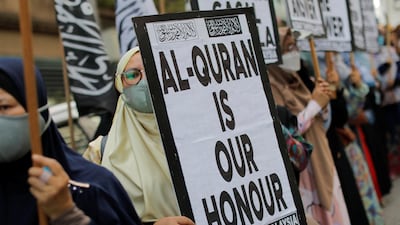Who would want to protect the far-right anti-Islam agitator Rasmus Paludan? Who would want to give him permission to burn copies of the Quran in public, first in front of the Turkish embassy in Stockholm, Sweden, on January 21, and then last Friday in Denmark, in front of a mosque as well as the Turkish embassy in Copenhagen?
Because, to be clear, he had to apply to commit this heinous act in Sweden, and the authorities knew what he was planning in Denmark – and in both countries he did so, astoundingly, under police protection.
The authorities’ allowance of these appalling acts that caused outrage across the Muslim world was not about freedom of speech. There was no discussion. No point was made, beyond aiming to be as needlessly provocative and hurtful as possible.
No. This was a manifestation of a phenomenon widespread across European countries that are on their way to becoming post-Christian – only nine percent of the population in Sweden go to church at least once a month, and 10 percent in Denmark. These are societies that have completely lost the concept of the sacrilegious.
When religiosity in European native communities is so low – it is frequently quite a different matter among immigrant populations – a false equivalence is sometimes made. There is a school of commentators who say: if we wouldn't try to stop you from burning a Bible, why can’t others respect our cultural norms? But this is indifference masquerading as tolerance. When these commentators have little attachment to faith, it simply doesn’t matter to them if a holy book is burned in the way that it does to a religious person.
The Cambridge dictionary defines sacrilegious as “treating something holy or important without respect” and it is a concept that used to be both widely understood and deeply felt in Europe. I have an older relative, for instance, who was upset by the routines involving Catholic priests that the Irish comedian Dave Allen used to perform on his UK television show in the 1980s, even though they were mostly pretty harmless. I recall one in which a priest leans against a pew, which rolls over, causing all the other pews to fall like dominoes. To my relative, however, it was simple: you did not mock the church.
He has never, and will never, watch Monty Python’s Life of Brian, which was considered by many to be blasphemous when it came out in 1979 and was banned in several countries. He would understand the deep significance of burning any holy book. He would understand that the imperative to act with decorum in any church, mosque or synagogue is not just a question of being polite to others, which is what plenty of well-meaning people in Europe may think nowadays. My relative would know that the prohibition against disrespectful behaviour is so strong because they are Houses of God. Anyone even mildly religious would feel that the slightest violation of those spaces would risk baleful consequences. But to what extent do societies such as those in Sweden and Denmark genuinely understand or have any time for such concepts anymore?
The burning of holy books may not be illegal in those two countries, but maybe it should be. In Malaysia, prime minister Anwar Ibrahim recently stated that the burning of any religious book or text, including the Quran, the Bible or the Hindu holy texts, will not be tolerated – with very good reason in a country with such diverse faiths and ethnicities.
In 2010, a high court judge banned the burning of religious books in South Africa. Has anyone noticed any diminution of freedom of speech or expression in the country because of that ruling since? Of course not. The following year, a UK court jailed a man for burning the Quran in public, and the Racial and Religious Hatred Act 2006 made “stirring up hatred on racial or religious grounds” an offence. If there has been any restriction on free speech in Britain since, it has been due to the online pile-ons of the wokerati, not to the law just mentioned.
For the liberty granted to Rasmus Paludan is one without virtue or purpose, other than the fomentation of hatred and the causing of the utmost gratuitous offence. It is a worthless liberty, one that Sweden and Denmark should pass laws to curtail.
Such a law would do nothing to impede Europeans continuing with their own tradition of free speech. It is worth noting that Britain’s 2006 Act specifically declares that “nothing… shall be read or given effect in a way which prohibits or restricts discussion, criticism or expressions of antipathy, dislike, ridicule, insult or abuse of particular religions or the beliefs or practices of their adherents.” The scurrilous French magazine Charlie Hebdo, in other words, would have nothing to fear from similar legislation.
There are just some things that you do not do, and should not be allowed to do – which is something the new illiberal left in Europe know very well, even if they have forgotten the concept of sacrilege. And really, does anyone want to argue that the cornerstone of their freedoms is the ability to burn holy books? Surely the notion of liberty stands for something more noble than that.



















